Digital Technology in UK Healthcare
VerifiedAdded on 2020/06/05
|16
|4809
|43
AI Summary
This assignment delves into the impact of digital technology on healthcare delivery within the United Kingdom. It analyzes diverse applications of technology like electronic patient records, telehealth, and mobile health, highlighting both benefits and challenges. The document also considers the role of sociotechnical systems and explores future trends in the integration of digital technologies into UK healthcare.
Contribute Materials
Your contribution can guide someone’s learning journey. Share your
documents today.
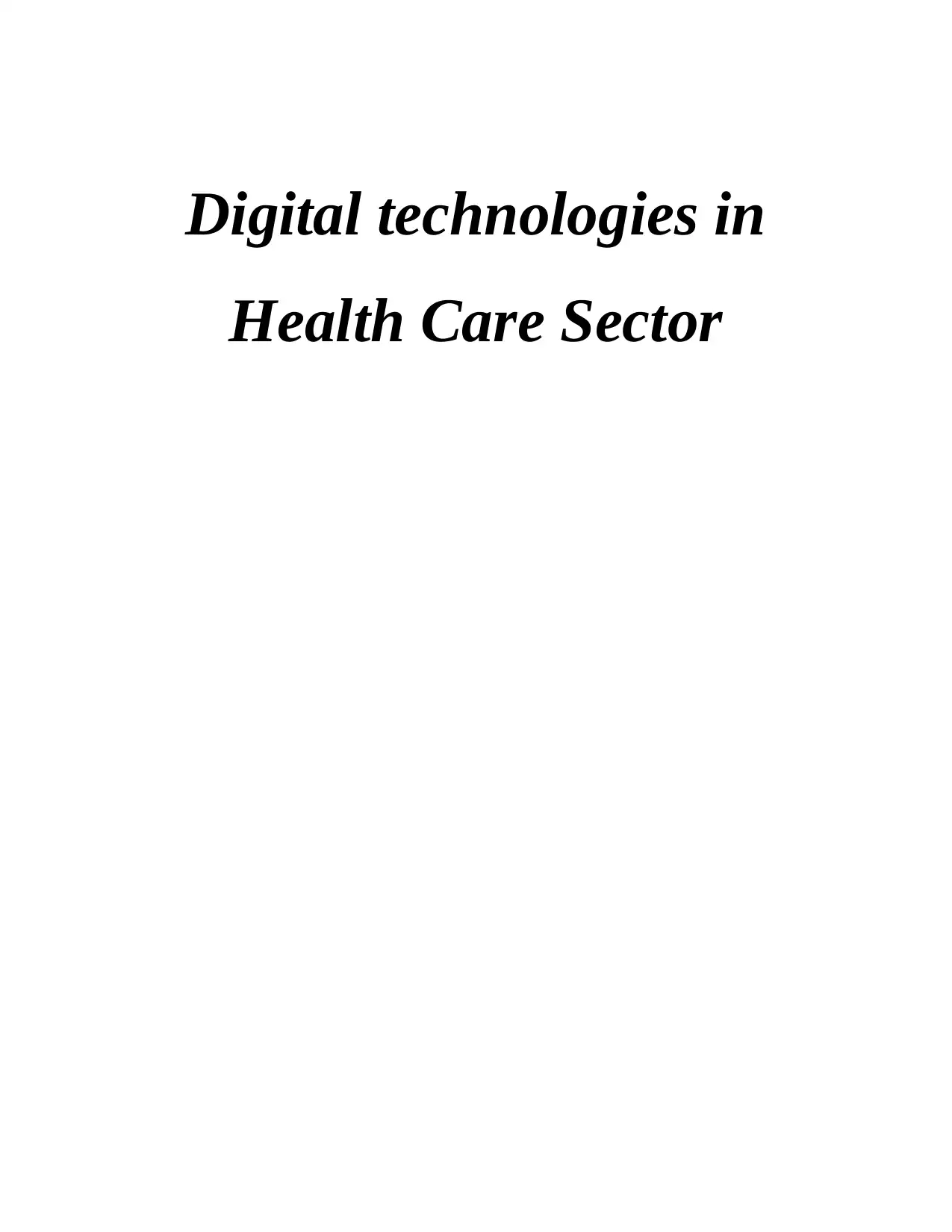
Digital technologies in
Health Care Sector
Health Care Sector
Secure Best Marks with AI Grader
Need help grading? Try our AI Grader for instant feedback on your assignments.
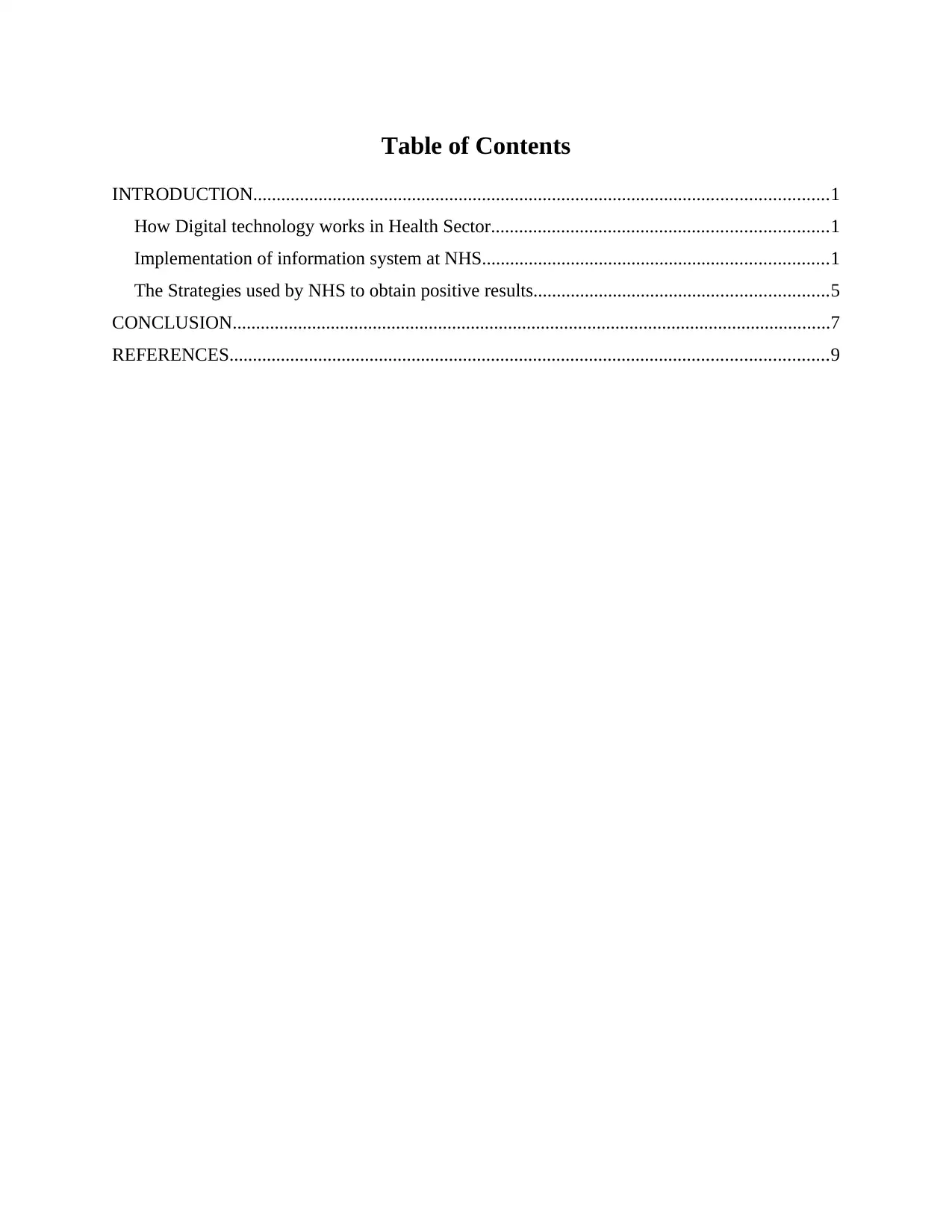
Table of Contents
INTRODUCTION...........................................................................................................................1
How Digital technology works in Health Sector........................................................................1
Implementation of information system at NHS..........................................................................1
The Strategies used by NHS to obtain positive results...............................................................5
CONCLUSION................................................................................................................................7
REFERENCES................................................................................................................................9
INTRODUCTION...........................................................................................................................1
How Digital technology works in Health Sector........................................................................1
Implementation of information system at NHS..........................................................................1
The Strategies used by NHS to obtain positive results...............................................................5
CONCLUSION................................................................................................................................7
REFERENCES................................................................................................................................9
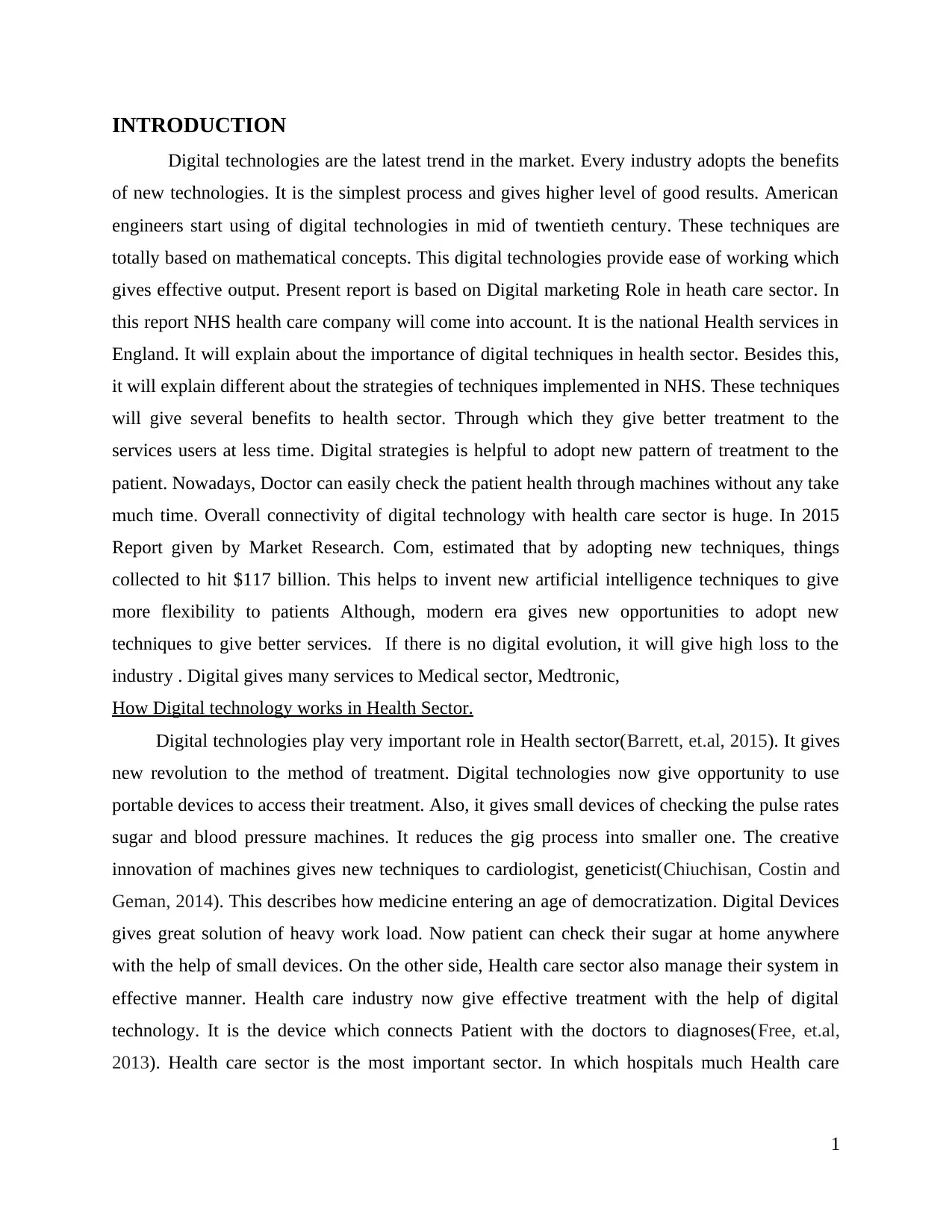
INTRODUCTION
Digital technologies are the latest trend in the market. Every industry adopts the benefits
of new technologies. It is the simplest process and gives higher level of good results. American
engineers start using of digital technologies in mid of twentieth century. These techniques are
totally based on mathematical concepts. This digital technologies provide ease of working which
gives effective output. Present report is based on Digital marketing Role in heath care sector. In
this report NHS health care company will come into account. It is the national Health services in
England. It will explain about the importance of digital techniques in health sector. Besides this,
it will explain different about the strategies of techniques implemented in NHS. These techniques
will give several benefits to health sector. Through which they give better treatment to the
services users at less time. Digital strategies is helpful to adopt new pattern of treatment to the
patient. Nowadays, Doctor can easily check the patient health through machines without any take
much time. Overall connectivity of digital technology with health care sector is huge. In 2015
Report given by Market Research. Com, estimated that by adopting new techniques, things
collected to hit $117 billion. This helps to invent new artificial intelligence techniques to give
more flexibility to patients Although, modern era gives new opportunities to adopt new
techniques to give better services. If there is no digital evolution, it will give high loss to the
industry . Digital gives many services to Medical sector, Medtronic,
How Digital technology works in Health Sector.
Digital technologies play very important role in Health sector(Barrett, et.al, 2015). It gives
new revolution to the method of treatment. Digital technologies now give opportunity to use
portable devices to access their treatment. Also, it gives small devices of checking the pulse rates
sugar and blood pressure machines. It reduces the gig process into smaller one. The creative
innovation of machines gives new techniques to cardiologist, geneticist(Chiuchisan, Costin and
Geman, 2014). This describes how medicine entering an age of democratization. Digital Devices
gives great solution of heavy work load. Now patient can check their sugar at home anywhere
with the help of small devices. On the other side, Health care sector also manage their system in
effective manner. Health care industry now give effective treatment with the help of digital
technology. It is the device which connects Patient with the doctors to diagnoses(Free, et.al,
2013). Health care sector is the most important sector. In which hospitals much Health care
1
Digital technologies are the latest trend in the market. Every industry adopts the benefits
of new technologies. It is the simplest process and gives higher level of good results. American
engineers start using of digital technologies in mid of twentieth century. These techniques are
totally based on mathematical concepts. This digital technologies provide ease of working which
gives effective output. Present report is based on Digital marketing Role in heath care sector. In
this report NHS health care company will come into account. It is the national Health services in
England. It will explain about the importance of digital techniques in health sector. Besides this,
it will explain different about the strategies of techniques implemented in NHS. These techniques
will give several benefits to health sector. Through which they give better treatment to the
services users at less time. Digital strategies is helpful to adopt new pattern of treatment to the
patient. Nowadays, Doctor can easily check the patient health through machines without any take
much time. Overall connectivity of digital technology with health care sector is huge. In 2015
Report given by Market Research. Com, estimated that by adopting new techniques, things
collected to hit $117 billion. This helps to invent new artificial intelligence techniques to give
more flexibility to patients Although, modern era gives new opportunities to adopt new
techniques to give better services. If there is no digital evolution, it will give high loss to the
industry . Digital gives many services to Medical sector, Medtronic,
How Digital technology works in Health Sector.
Digital technologies play very important role in Health sector(Barrett, et.al, 2015). It gives
new revolution to the method of treatment. Digital technologies now give opportunity to use
portable devices to access their treatment. Also, it gives small devices of checking the pulse rates
sugar and blood pressure machines. It reduces the gig process into smaller one. The creative
innovation of machines gives new techniques to cardiologist, geneticist(Chiuchisan, Costin and
Geman, 2014). This describes how medicine entering an age of democratization. Digital Devices
gives great solution of heavy work load. Now patient can check their sugar at home anywhere
with the help of small devices. On the other side, Health care sector also manage their system in
effective manner. Health care industry now give effective treatment with the help of digital
technology. It is the device which connects Patient with the doctors to diagnoses(Free, et.al,
2013). Health care sector is the most important sector. In which hospitals much Health care
1
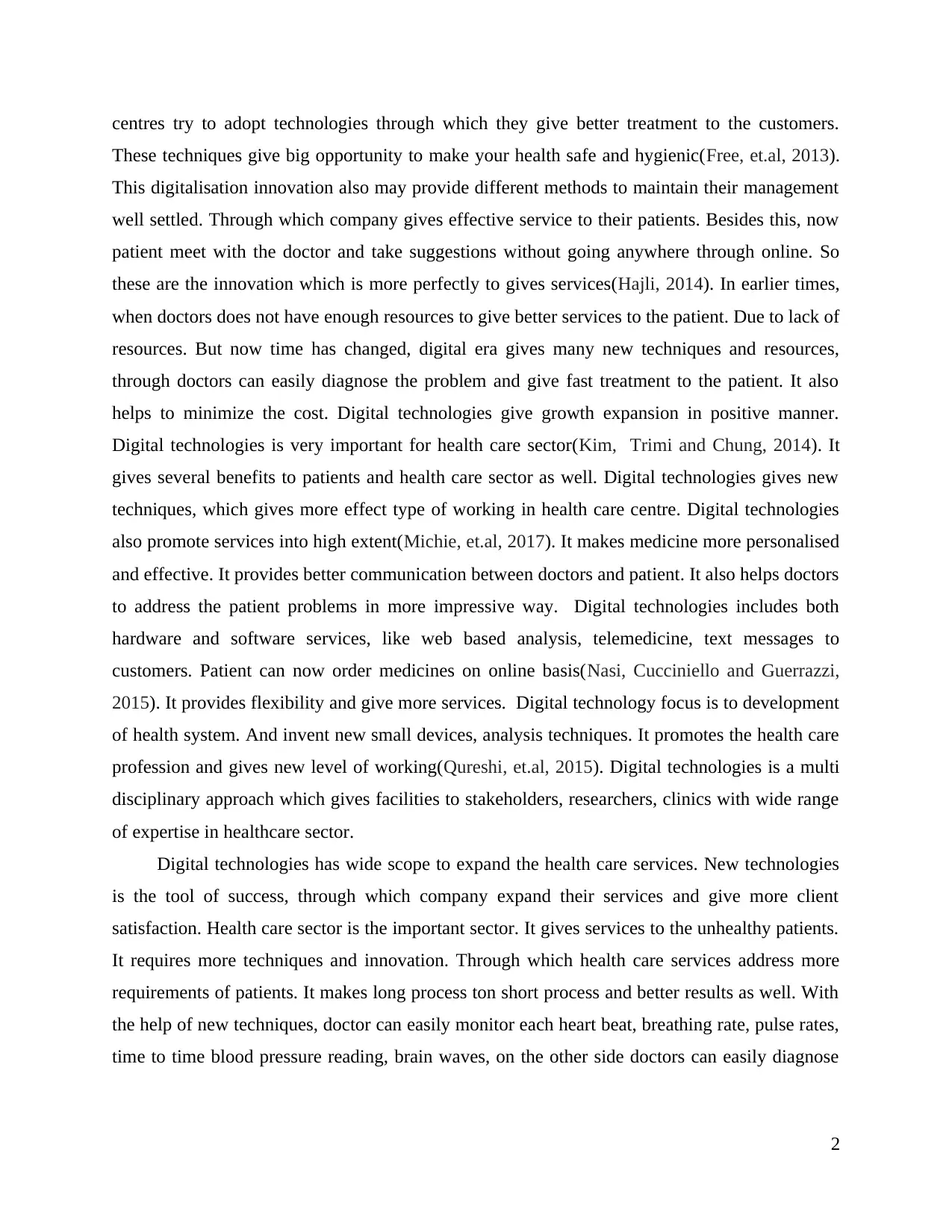
centres try to adopt technologies through which they give better treatment to the customers.
These techniques give big opportunity to make your health safe and hygienic(Free, et.al, 2013).
This digitalisation innovation also may provide different methods to maintain their management
well settled. Through which company gives effective service to their patients. Besides this, now
patient meet with the doctor and take suggestions without going anywhere through online. So
these are the innovation which is more perfectly to gives services(Hajli, 2014). In earlier times,
when doctors does not have enough resources to give better services to the patient. Due to lack of
resources. But now time has changed, digital era gives many new techniques and resources,
through doctors can easily diagnose the problem and give fast treatment to the patient. It also
helps to minimize the cost. Digital technologies give growth expansion in positive manner.
Digital technologies is very important for health care sector(Kim, Trimi and Chung, 2014). It
gives several benefits to patients and health care sector as well. Digital technologies gives new
techniques, which gives more effect type of working in health care centre. Digital technologies
also promote services into high extent(Michie, et.al, 2017). It makes medicine more personalised
and effective. It provides better communication between doctors and patient. It also helps doctors
to address the patient problems in more impressive way. Digital technologies includes both
hardware and software services, like web based analysis, telemedicine, text messages to
customers. Patient can now order medicines on online basis(Nasi, Cucciniello and Guerrazzi,
2015). It provides flexibility and give more services. Digital technology focus is to development
of health system. And invent new small devices, analysis techniques. It promotes the health care
profession and gives new level of working(Qureshi, et.al, 2015). Digital technologies is a multi
disciplinary approach which gives facilities to stakeholders, researchers, clinics with wide range
of expertise in healthcare sector.
Digital technologies has wide scope to expand the health care services. New technologies
is the tool of success, through which company expand their services and give more client
satisfaction. Health care sector is the important sector. It gives services to the unhealthy patients.
It requires more techniques and innovation. Through which health care services address more
requirements of patients. It makes long process ton short process and better results as well. With
the help of new techniques, doctor can easily monitor each heart beat, breathing rate, pulse rates,
time to time blood pressure reading, brain waves, on the other side doctors can easily diagnose
2
These techniques give big opportunity to make your health safe and hygienic(Free, et.al, 2013).
This digitalisation innovation also may provide different methods to maintain their management
well settled. Through which company gives effective service to their patients. Besides this, now
patient meet with the doctor and take suggestions without going anywhere through online. So
these are the innovation which is more perfectly to gives services(Hajli, 2014). In earlier times,
when doctors does not have enough resources to give better services to the patient. Due to lack of
resources. But now time has changed, digital era gives many new techniques and resources,
through doctors can easily diagnose the problem and give fast treatment to the patient. It also
helps to minimize the cost. Digital technologies give growth expansion in positive manner.
Digital technologies is very important for health care sector(Kim, Trimi and Chung, 2014). It
gives several benefits to patients and health care sector as well. Digital technologies gives new
techniques, which gives more effect type of working in health care centre. Digital technologies
also promote services into high extent(Michie, et.al, 2017). It makes medicine more personalised
and effective. It provides better communication between doctors and patient. It also helps doctors
to address the patient problems in more impressive way. Digital technologies includes both
hardware and software services, like web based analysis, telemedicine, text messages to
customers. Patient can now order medicines on online basis(Nasi, Cucciniello and Guerrazzi,
2015). It provides flexibility and give more services. Digital technology focus is to development
of health system. And invent new small devices, analysis techniques. It promotes the health care
profession and gives new level of working(Qureshi, et.al, 2015). Digital technologies is a multi
disciplinary approach which gives facilities to stakeholders, researchers, clinics with wide range
of expertise in healthcare sector.
Digital technologies has wide scope to expand the health care services. New technologies
is the tool of success, through which company expand their services and give more client
satisfaction. Health care sector is the important sector. It gives services to the unhealthy patients.
It requires more techniques and innovation. Through which health care services address more
requirements of patients. It makes long process ton short process and better results as well. With
the help of new techniques, doctor can easily monitor each heart beat, breathing rate, pulse rates,
time to time blood pressure reading, brain waves, on the other side doctors can easily diagnose
2
Secure Best Marks with AI Grader
Need help grading? Try our AI Grader for instant feedback on your assignments.
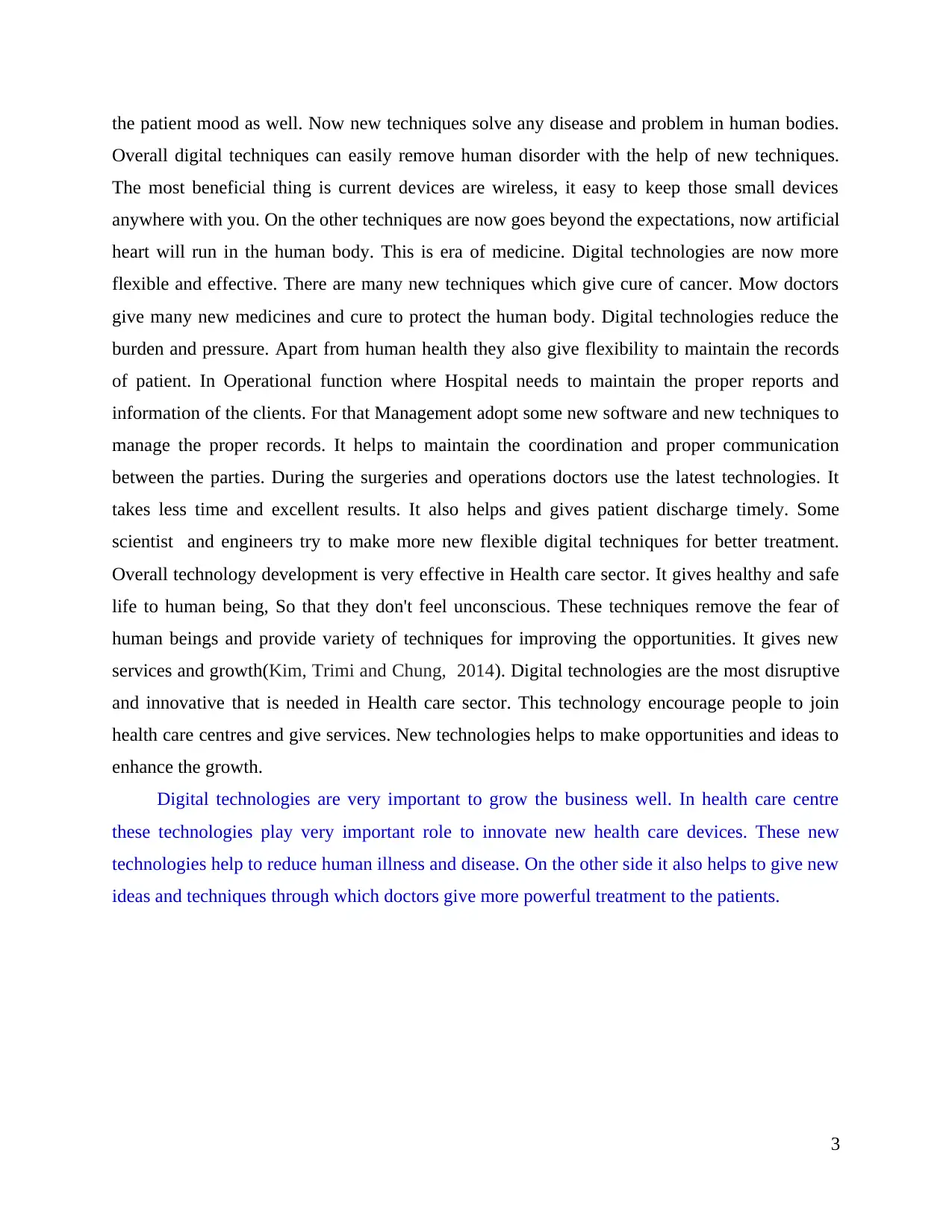
the patient mood as well. Now new techniques solve any disease and problem in human bodies.
Overall digital techniques can easily remove human disorder with the help of new techniques.
The most beneficial thing is current devices are wireless, it easy to keep those small devices
anywhere with you. On the other techniques are now goes beyond the expectations, now artificial
heart will run in the human body. This is era of medicine. Digital technologies are now more
flexible and effective. There are many new techniques which give cure of cancer. Mow doctors
give many new medicines and cure to protect the human body. Digital technologies reduce the
burden and pressure. Apart from human health they also give flexibility to maintain the records
of patient. In Operational function where Hospital needs to maintain the proper reports and
information of the clients. For that Management adopt some new software and new techniques to
manage the proper records. It helps to maintain the coordination and proper communication
between the parties. During the surgeries and operations doctors use the latest technologies. It
takes less time and excellent results. It also helps and gives patient discharge timely. Some
scientist and engineers try to make more new flexible digital techniques for better treatment.
Overall technology development is very effective in Health care sector. It gives healthy and safe
life to human being, So that they don't feel unconscious. These techniques remove the fear of
human beings and provide variety of techniques for improving the opportunities. It gives new
services and growth(Kim, Trimi and Chung, 2014). Digital technologies are the most disruptive
and innovative that is needed in Health care sector. This technology encourage people to join
health care centres and give services. New technologies helps to make opportunities and ideas to
enhance the growth.
Digital technologies are very important to grow the business well. In health care centre
these technologies play very important role to innovate new health care devices. These new
technologies help to reduce human illness and disease. On the other side it also helps to give new
ideas and techniques through which doctors give more powerful treatment to the patients.
3
Overall digital techniques can easily remove human disorder with the help of new techniques.
The most beneficial thing is current devices are wireless, it easy to keep those small devices
anywhere with you. On the other techniques are now goes beyond the expectations, now artificial
heart will run in the human body. This is era of medicine. Digital technologies are now more
flexible and effective. There are many new techniques which give cure of cancer. Mow doctors
give many new medicines and cure to protect the human body. Digital technologies reduce the
burden and pressure. Apart from human health they also give flexibility to maintain the records
of patient. In Operational function where Hospital needs to maintain the proper reports and
information of the clients. For that Management adopt some new software and new techniques to
manage the proper records. It helps to maintain the coordination and proper communication
between the parties. During the surgeries and operations doctors use the latest technologies. It
takes less time and excellent results. It also helps and gives patient discharge timely. Some
scientist and engineers try to make more new flexible digital techniques for better treatment.
Overall technology development is very effective in Health care sector. It gives healthy and safe
life to human being, So that they don't feel unconscious. These techniques remove the fear of
human beings and provide variety of techniques for improving the opportunities. It gives new
services and growth(Kim, Trimi and Chung, 2014). Digital technologies are the most disruptive
and innovative that is needed in Health care sector. This technology encourage people to join
health care centres and give services. New technologies helps to make opportunities and ideas to
enhance the growth.
Digital technologies are very important to grow the business well. In health care centre
these technologies play very important role to innovate new health care devices. These new
technologies help to reduce human illness and disease. On the other side it also helps to give new
ideas and techniques through which doctors give more powerful treatment to the patients.
3
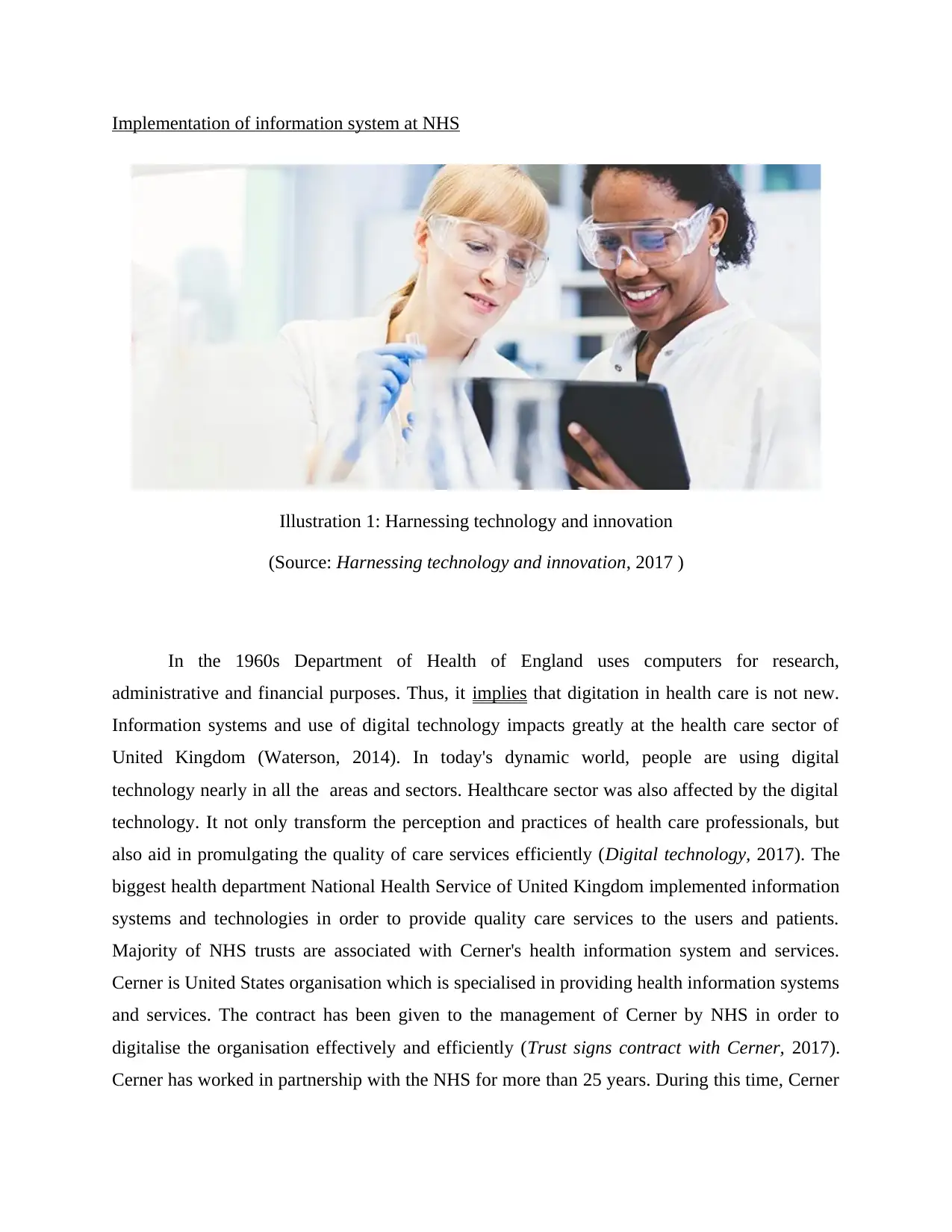
Implementation of information system at NHS
In the 1960s Department of Health of England uses computers for research,
administrative and financial purposes. Thus, it implies that digitation in health care is not new.
Information systems and use of digital technology impacts greatly at the health care sector of
United Kingdom (Waterson, 2014). In today's dynamic world, people are using digital
technology nearly in all the areas and sectors. Healthcare sector was also affected by the digital
technology. It not only transform the perception and practices of health care professionals, but
also aid in promulgating the quality of care services efficiently (Digital technology, 2017). The
biggest health department National Health Service of United Kingdom implemented information
systems and technologies in order to provide quality care services to the users and patients.
Majority of NHS trusts are associated with Cerner's health information system and services.
Cerner is United States organisation which is specialised in providing health information systems
and services. The contract has been given to the management of Cerner by NHS in order to
digitalise the organisation effectively and efficiently (Trust signs contract with Cerner, 2017).
Cerner has worked in partnership with the NHS for more than 25 years. During this time, Cerner
Illustration 1: Harnessing technology and innovation
(Source: Harnessing technology and innovation, 2017 )
In the 1960s Department of Health of England uses computers for research,
administrative and financial purposes. Thus, it implies that digitation in health care is not new.
Information systems and use of digital technology impacts greatly at the health care sector of
United Kingdom (Waterson, 2014). In today's dynamic world, people are using digital
technology nearly in all the areas and sectors. Healthcare sector was also affected by the digital
technology. It not only transform the perception and practices of health care professionals, but
also aid in promulgating the quality of care services efficiently (Digital technology, 2017). The
biggest health department National Health Service of United Kingdom implemented information
systems and technologies in order to provide quality care services to the users and patients.
Majority of NHS trusts are associated with Cerner's health information system and services.
Cerner is United States organisation which is specialised in providing health information systems
and services. The contract has been given to the management of Cerner by NHS in order to
digitalise the organisation effectively and efficiently (Trust signs contract with Cerner, 2017).
Cerner has worked in partnership with the NHS for more than 25 years. During this time, Cerner
Illustration 1: Harnessing technology and innovation
(Source: Harnessing technology and innovation, 2017 )
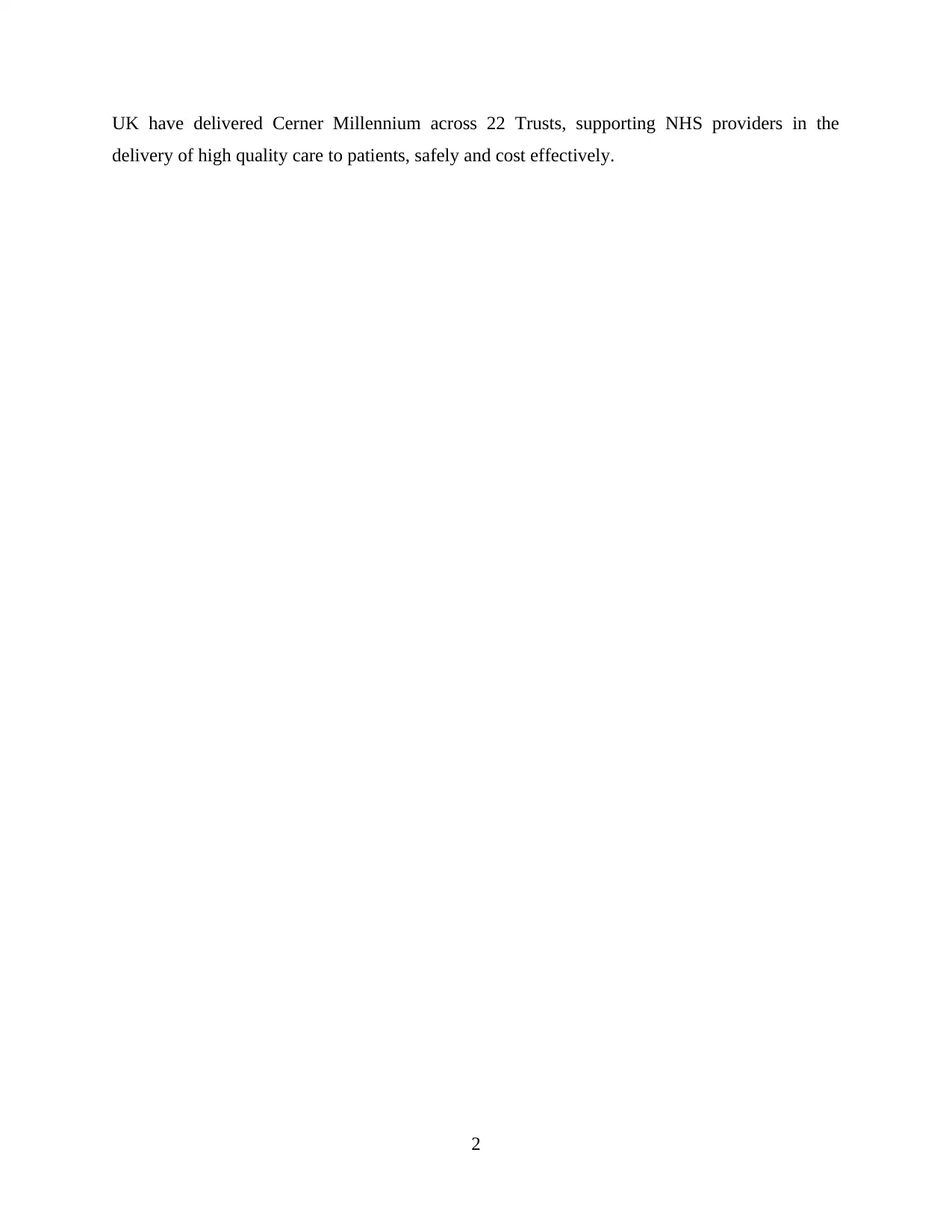
UK have delivered Cerner Millennium across 22 Trusts, supporting NHS providers in the
delivery of high quality care to patients, safely and cost effectively.
2
delivery of high quality care to patients, safely and cost effectively.
2
Paraphrase This Document
Need a fresh take? Get an instant paraphrase of this document with our AI Paraphraser
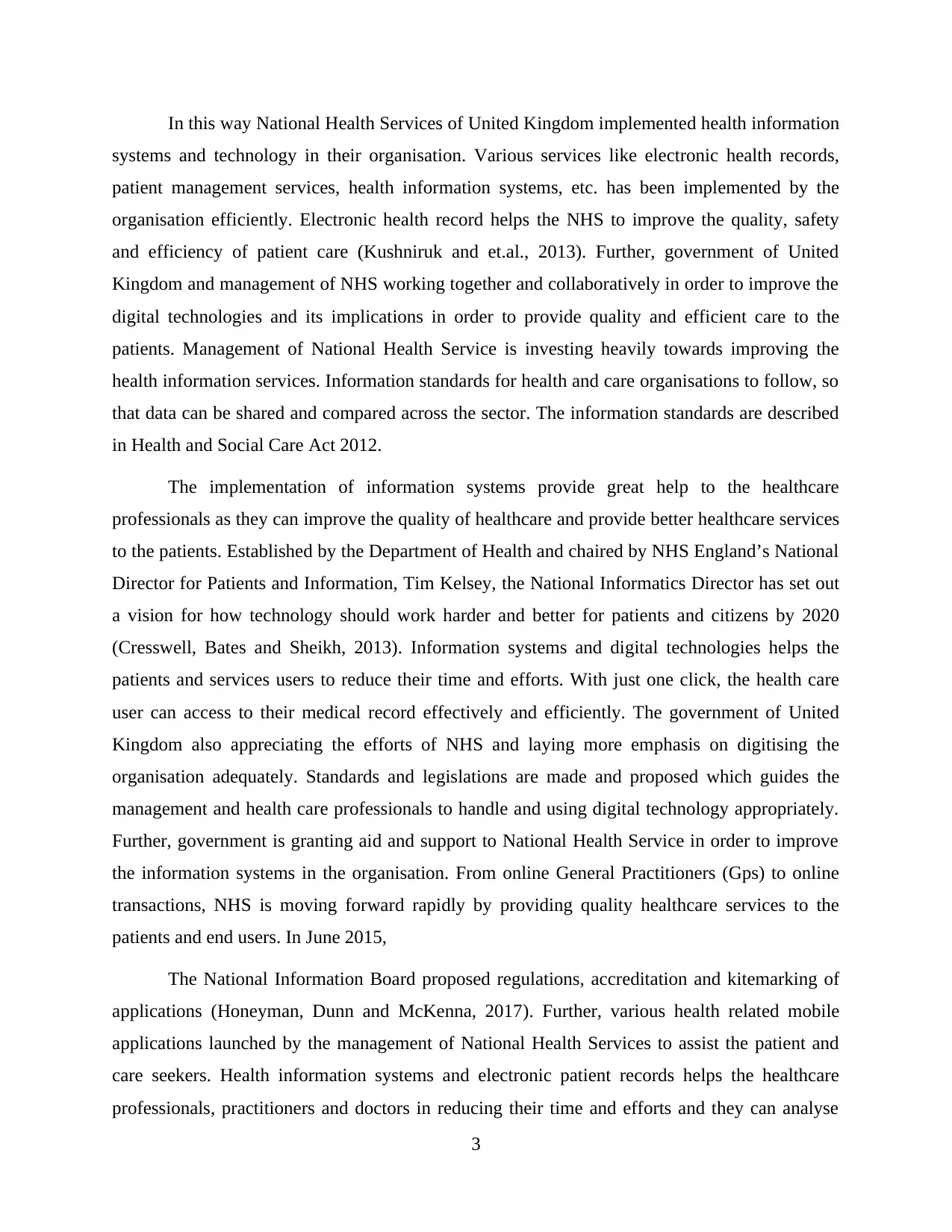
In this way National Health Services of United Kingdom implemented health information
systems and technology in their organisation. Various services like electronic health records,
patient management services, health information systems, etc. has been implemented by the
organisation efficiently. Electronic health record helps the NHS to improve the quality, safety
and efficiency of patient care (Kushniruk and et.al., 2013). Further, government of United
Kingdom and management of NHS working together and collaboratively in order to improve the
digital technologies and its implications in order to provide quality and efficient care to the
patients. Management of National Health Service is investing heavily towards improving the
health information services. Information standards for health and care organisations to follow, so
that data can be shared and compared across the sector. The information standards are described
in Health and Social Care Act 2012.
The implementation of information systems provide great help to the healthcare
professionals as they can improve the quality of healthcare and provide better healthcare services
to the patients. Established by the Department of Health and chaired by NHS England’s National
Director for Patients and Information, Tim Kelsey, the National Informatics Director has set out
a vision for how technology should work harder and better for patients and citizens by 2020
(Cresswell, Bates and Sheikh, 2013). Information systems and digital technologies helps the
patients and services users to reduce their time and efforts. With just one click, the health care
user can access to their medical record effectively and efficiently. The government of United
Kingdom also appreciating the efforts of NHS and laying more emphasis on digitising the
organisation adequately. Standards and legislations are made and proposed which guides the
management and health care professionals to handle and using digital technology appropriately.
Further, government is granting aid and support to National Health Service in order to improve
the information systems in the organisation. From online General Practitioners (Gps) to online
transactions, NHS is moving forward rapidly by providing quality healthcare services to the
patients and end users. In June 2015,
The National Information Board proposed regulations, accreditation and kitemarking of
applications (Honeyman, Dunn and McKenna, 2017). Further, various health related mobile
applications launched by the management of National Health Services to assist the patient and
care seekers. Health information systems and electronic patient records helps the healthcare
professionals, practitioners and doctors in reducing their time and efforts and they can analyse
3
systems and technology in their organisation. Various services like electronic health records,
patient management services, health information systems, etc. has been implemented by the
organisation efficiently. Electronic health record helps the NHS to improve the quality, safety
and efficiency of patient care (Kushniruk and et.al., 2013). Further, government of United
Kingdom and management of NHS working together and collaboratively in order to improve the
digital technologies and its implications in order to provide quality and efficient care to the
patients. Management of National Health Service is investing heavily towards improving the
health information services. Information standards for health and care organisations to follow, so
that data can be shared and compared across the sector. The information standards are described
in Health and Social Care Act 2012.
The implementation of information systems provide great help to the healthcare
professionals as they can improve the quality of healthcare and provide better healthcare services
to the patients. Established by the Department of Health and chaired by NHS England’s National
Director for Patients and Information, Tim Kelsey, the National Informatics Director has set out
a vision for how technology should work harder and better for patients and citizens by 2020
(Cresswell, Bates and Sheikh, 2013). Information systems and digital technologies helps the
patients and services users to reduce their time and efforts. With just one click, the health care
user can access to their medical record effectively and efficiently. The government of United
Kingdom also appreciating the efforts of NHS and laying more emphasis on digitising the
organisation adequately. Standards and legislations are made and proposed which guides the
management and health care professionals to handle and using digital technology appropriately.
Further, government is granting aid and support to National Health Service in order to improve
the information systems in the organisation. From online General Practitioners (Gps) to online
transactions, NHS is moving forward rapidly by providing quality healthcare services to the
patients and end users. In June 2015,
The National Information Board proposed regulations, accreditation and kitemarking of
applications (Honeyman, Dunn and McKenna, 2017). Further, various health related mobile
applications launched by the management of National Health Services to assist the patient and
care seekers. Health information systems and electronic patient records helps the healthcare
professionals, practitioners and doctors in reducing their time and efforts and they can analyse
3
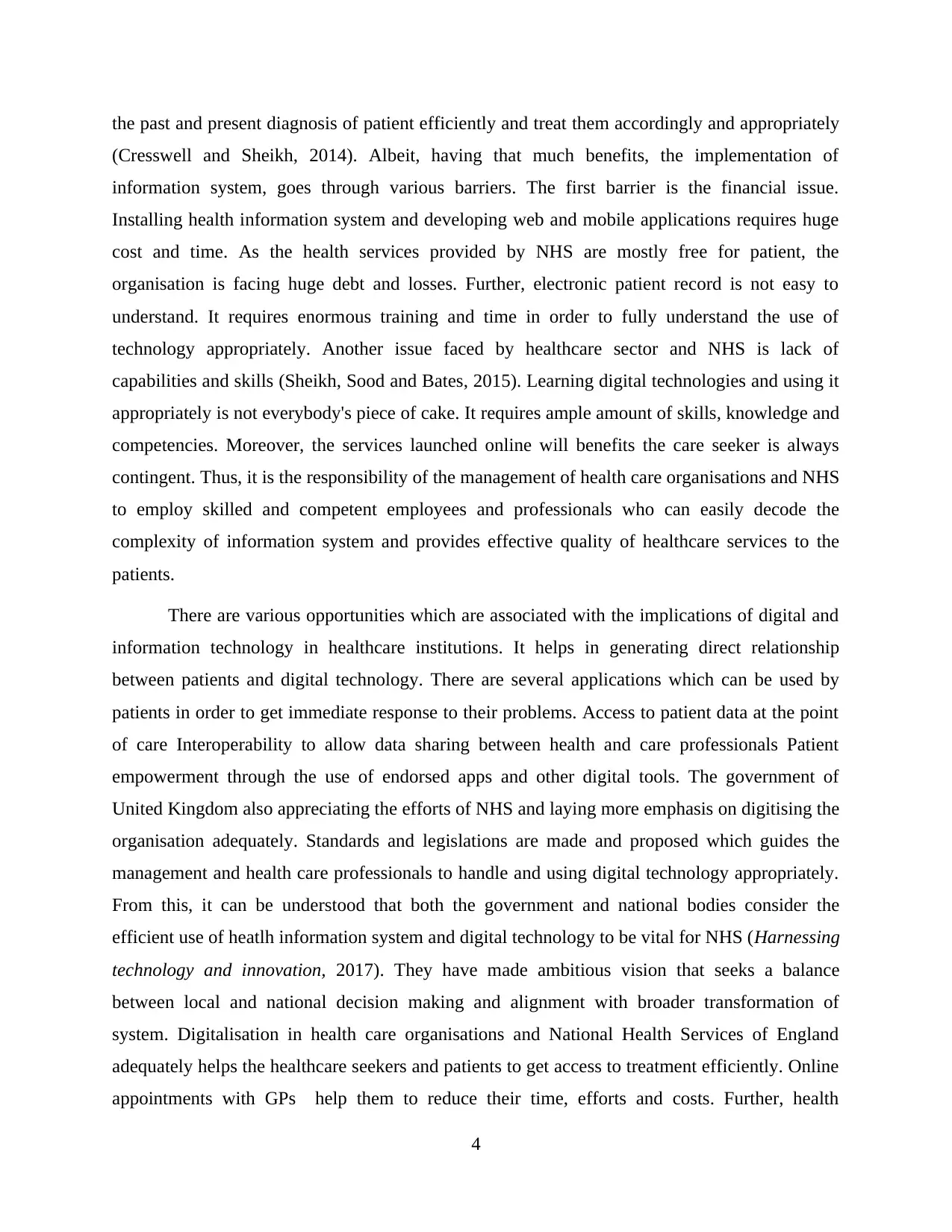
the past and present diagnosis of patient efficiently and treat them accordingly and appropriately
(Cresswell and Sheikh, 2014). Albeit, having that much benefits, the implementation of
information system, goes through various barriers. The first barrier is the financial issue.
Installing health information system and developing web and mobile applications requires huge
cost and time. As the health services provided by NHS are mostly free for patient, the
organisation is facing huge debt and losses. Further, electronic patient record is not easy to
understand. It requires enormous training and time in order to fully understand the use of
technology appropriately. Another issue faced by healthcare sector and NHS is lack of
capabilities and skills (Sheikh, Sood and Bates, 2015). Learning digital technologies and using it
appropriately is not everybody's piece of cake. It requires ample amount of skills, knowledge and
competencies. Moreover, the services launched online will benefits the care seeker is always
contingent. Thus, it is the responsibility of the management of health care organisations and NHS
to employ skilled and competent employees and professionals who can easily decode the
complexity of information system and provides effective quality of healthcare services to the
patients.
There are various opportunities which are associated with the implications of digital and
information technology in healthcare institutions. It helps in generating direct relationship
between patients and digital technology. There are several applications which can be used by
patients in order to get immediate response to their problems. Access to patient data at the point
of care Interoperability to allow data sharing between health and care professionals Patient
empowerment through the use of endorsed apps and other digital tools. The government of
United Kingdom also appreciating the efforts of NHS and laying more emphasis on digitising the
organisation adequately. Standards and legislations are made and proposed which guides the
management and health care professionals to handle and using digital technology appropriately.
From this, it can be understood that both the government and national bodies consider the
efficient use of heatlh information system and digital technology to be vital for NHS (Harnessing
technology and innovation, 2017). They have made ambitious vision that seeks a balance
between local and national decision making and alignment with broader transformation of
system. Digitalisation in health care organisations and National Health Services of England
adequately helps the healthcare seekers and patients to get access to treatment efficiently. Online
appointments with GPs help them to reduce their time, efforts and costs. Further, health
4
(Cresswell and Sheikh, 2014). Albeit, having that much benefits, the implementation of
information system, goes through various barriers. The first barrier is the financial issue.
Installing health information system and developing web and mobile applications requires huge
cost and time. As the health services provided by NHS are mostly free for patient, the
organisation is facing huge debt and losses. Further, electronic patient record is not easy to
understand. It requires enormous training and time in order to fully understand the use of
technology appropriately. Another issue faced by healthcare sector and NHS is lack of
capabilities and skills (Sheikh, Sood and Bates, 2015). Learning digital technologies and using it
appropriately is not everybody's piece of cake. It requires ample amount of skills, knowledge and
competencies. Moreover, the services launched online will benefits the care seeker is always
contingent. Thus, it is the responsibility of the management of health care organisations and NHS
to employ skilled and competent employees and professionals who can easily decode the
complexity of information system and provides effective quality of healthcare services to the
patients.
There are various opportunities which are associated with the implications of digital and
information technology in healthcare institutions. It helps in generating direct relationship
between patients and digital technology. There are several applications which can be used by
patients in order to get immediate response to their problems. Access to patient data at the point
of care Interoperability to allow data sharing between health and care professionals Patient
empowerment through the use of endorsed apps and other digital tools. The government of
United Kingdom also appreciating the efforts of NHS and laying more emphasis on digitising the
organisation adequately. Standards and legislations are made and proposed which guides the
management and health care professionals to handle and using digital technology appropriately.
From this, it can be understood that both the government and national bodies consider the
efficient use of heatlh information system and digital technology to be vital for NHS (Harnessing
technology and innovation, 2017). They have made ambitious vision that seeks a balance
between local and national decision making and alignment with broader transformation of
system. Digitalisation in health care organisations and National Health Services of England
adequately helps the healthcare seekers and patients to get access to treatment efficiently. Online
appointments with GPs help them to reduce their time, efforts and costs. Further, health
4
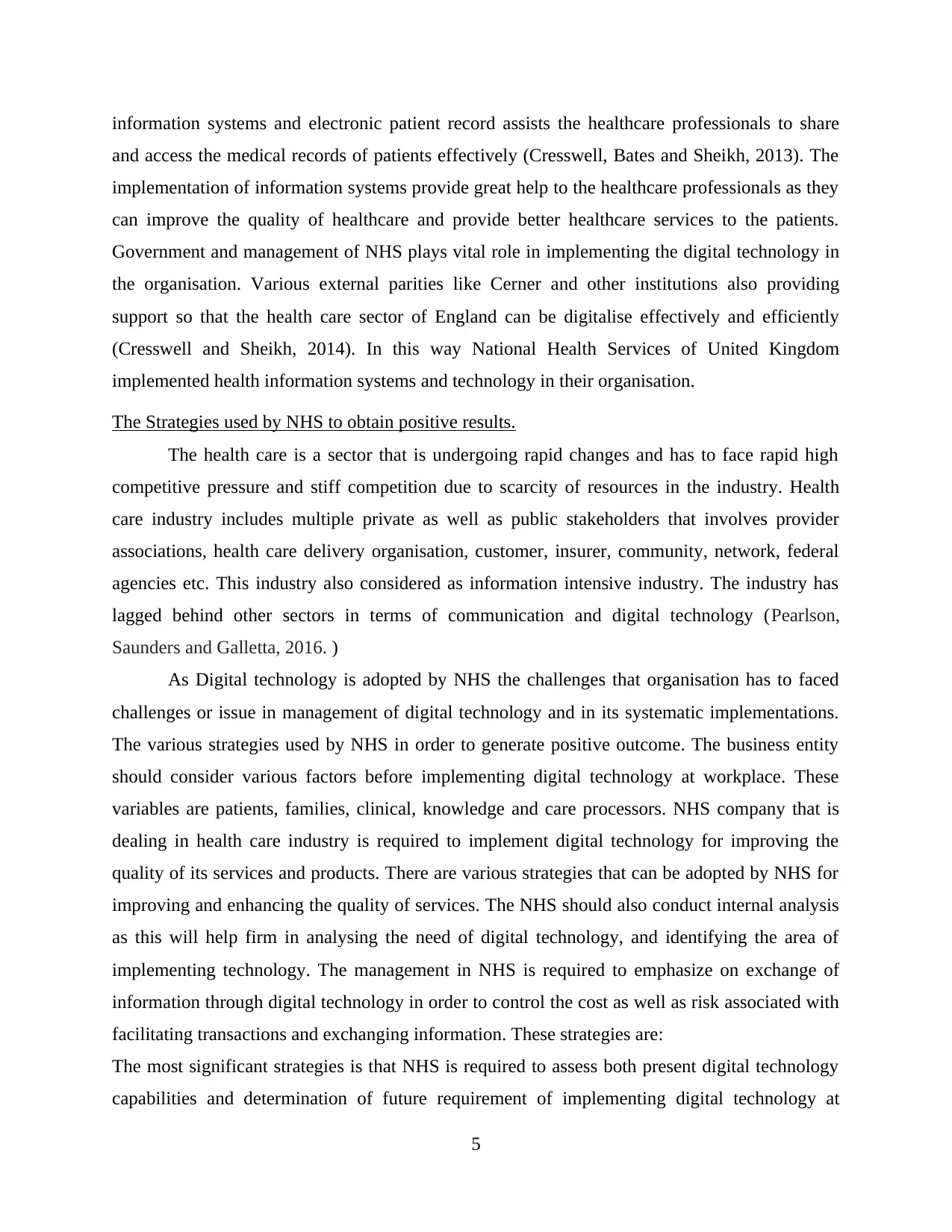
information systems and electronic patient record assists the healthcare professionals to share
and access the medical records of patients effectively (Cresswell, Bates and Sheikh, 2013). The
implementation of information systems provide great help to the healthcare professionals as they
can improve the quality of healthcare and provide better healthcare services to the patients.
Government and management of NHS plays vital role in implementing the digital technology in
the organisation. Various external parities like Cerner and other institutions also providing
support so that the health care sector of England can be digitalise effectively and efficiently
(Cresswell and Sheikh, 2014). In this way National Health Services of United Kingdom
implemented health information systems and technology in their organisation.
The Strategies used by NHS to obtain positive results.
The health care is a sector that is undergoing rapid changes and has to face rapid high
competitive pressure and stiff competition due to scarcity of resources in the industry. Health
care industry includes multiple private as well as public stakeholders that involves provider
associations, health care delivery organisation, customer, insurer, community, network, federal
agencies etc. This industry also considered as information intensive industry. The industry has
lagged behind other sectors in terms of communication and digital technology (Pearlson,
Saunders and Galletta, 2016. )
As Digital technology is adopted by NHS the challenges that organisation has to faced
challenges or issue in management of digital technology and in its systematic implementations.
The various strategies used by NHS in order to generate positive outcome. The business entity
should consider various factors before implementing digital technology at workplace. These
variables are patients, families, clinical, knowledge and care processors. NHS company that is
dealing in health care industry is required to implement digital technology for improving the
quality of its services and products. There are various strategies that can be adopted by NHS for
improving and enhancing the quality of services. The NHS should also conduct internal analysis
as this will help firm in analysing the need of digital technology, and identifying the area of
implementing technology. The management in NHS is required to emphasize on exchange of
information through digital technology in order to control the cost as well as risk associated with
facilitating transactions and exchanging information. These strategies are:
The most significant strategies is that NHS is required to assess both present digital technology
capabilities and determination of future requirement of implementing digital technology at
5
and access the medical records of patients effectively (Cresswell, Bates and Sheikh, 2013). The
implementation of information systems provide great help to the healthcare professionals as they
can improve the quality of healthcare and provide better healthcare services to the patients.
Government and management of NHS plays vital role in implementing the digital technology in
the organisation. Various external parities like Cerner and other institutions also providing
support so that the health care sector of England can be digitalise effectively and efficiently
(Cresswell and Sheikh, 2014). In this way National Health Services of United Kingdom
implemented health information systems and technology in their organisation.
The Strategies used by NHS to obtain positive results.
The health care is a sector that is undergoing rapid changes and has to face rapid high
competitive pressure and stiff competition due to scarcity of resources in the industry. Health
care industry includes multiple private as well as public stakeholders that involves provider
associations, health care delivery organisation, customer, insurer, community, network, federal
agencies etc. This industry also considered as information intensive industry. The industry has
lagged behind other sectors in terms of communication and digital technology (Pearlson,
Saunders and Galletta, 2016. )
As Digital technology is adopted by NHS the challenges that organisation has to faced
challenges or issue in management of digital technology and in its systematic implementations.
The various strategies used by NHS in order to generate positive outcome. The business entity
should consider various factors before implementing digital technology at workplace. These
variables are patients, families, clinical, knowledge and care processors. NHS company that is
dealing in health care industry is required to implement digital technology for improving the
quality of its services and products. There are various strategies that can be adopted by NHS for
improving and enhancing the quality of services. The NHS should also conduct internal analysis
as this will help firm in analysing the need of digital technology, and identifying the area of
implementing technology. The management in NHS is required to emphasize on exchange of
information through digital technology in order to control the cost as well as risk associated with
facilitating transactions and exchanging information. These strategies are:
The most significant strategies is that NHS is required to assess both present digital technology
capabilities and determination of future requirement of implementing digital technology at
5
Secure Best Marks with AI Grader
Need help grading? Try our AI Grader for instant feedback on your assignments.
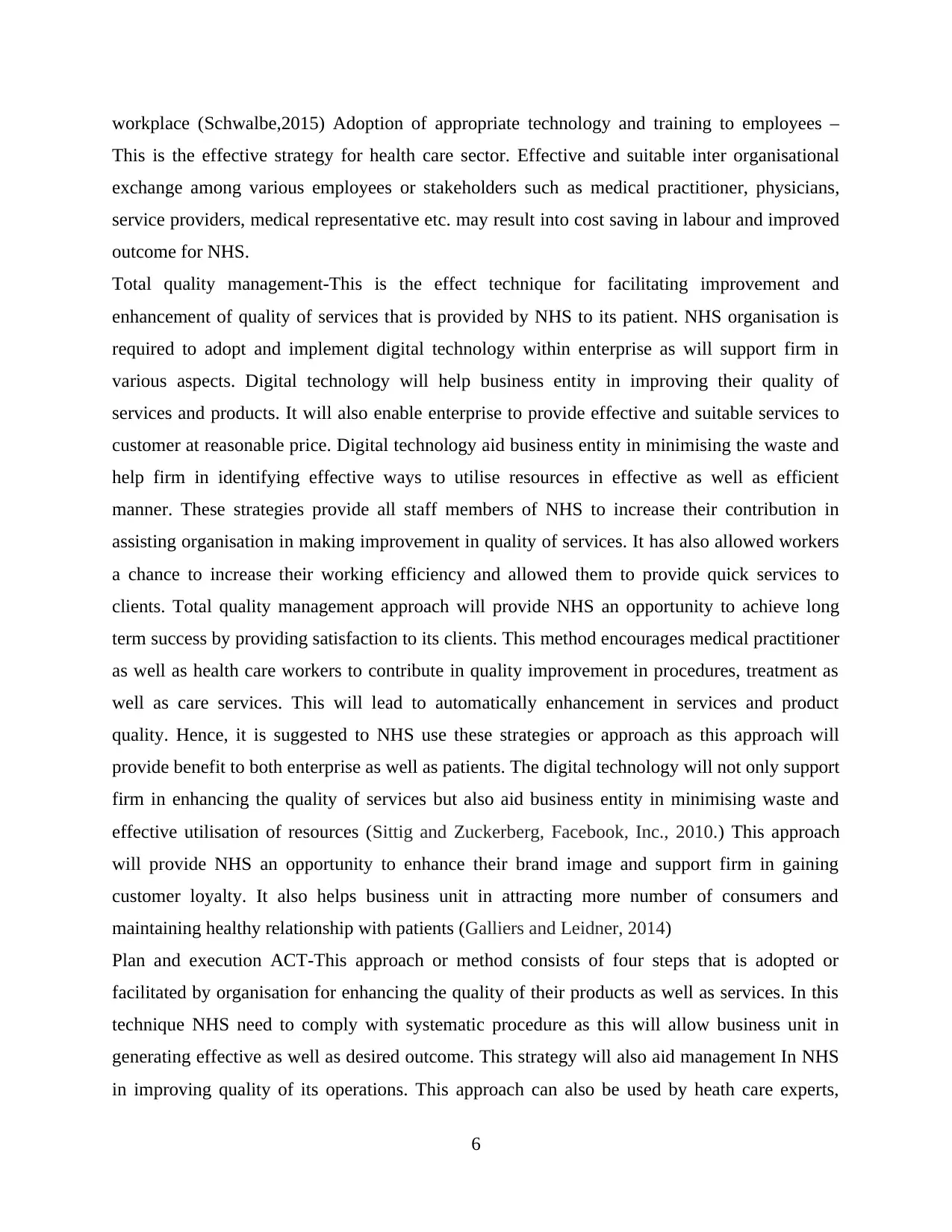
workplace (Schwalbe,2015) Adoption of appropriate technology and training to employees –
This is the effective strategy for health care sector. Effective and suitable inter organisational
exchange among various employees or stakeholders such as medical practitioner, physicians,
service providers, medical representative etc. may result into cost saving in labour and improved
outcome for NHS.
Total quality management-This is the effect technique for facilitating improvement and
enhancement of quality of services that is provided by NHS to its patient. NHS organisation is
required to adopt and implement digital technology within enterprise as will support firm in
various aspects. Digital technology will help business entity in improving their quality of
services and products. It will also enable enterprise to provide effective and suitable services to
customer at reasonable price. Digital technology aid business entity in minimising the waste and
help firm in identifying effective ways to utilise resources in effective as well as efficient
manner. These strategies provide all staff members of NHS to increase their contribution in
assisting organisation in making improvement in quality of services. It has also allowed workers
a chance to increase their working efficiency and allowed them to provide quick services to
clients. Total quality management approach will provide NHS an opportunity to achieve long
term success by providing satisfaction to its clients. This method encourages medical practitioner
as well as health care workers to contribute in quality improvement in procedures, treatment as
well as care services. This will lead to automatically enhancement in services and product
quality. Hence, it is suggested to NHS use these strategies or approach as this approach will
provide benefit to both enterprise as well as patients. The digital technology will not only support
firm in enhancing the quality of services but also aid business entity in minimising waste and
effective utilisation of resources (Sittig and Zuckerberg, Facebook, Inc., 2010.) This approach
will provide NHS an opportunity to enhance their brand image and support firm in gaining
customer loyalty. It also helps business unit in attracting more number of consumers and
maintaining healthy relationship with patients (Galliers and Leidner, 2014)
Plan and execution ACT-This approach or method consists of four steps that is adopted or
facilitated by organisation for enhancing the quality of their products as well as services. In this
technique NHS need to comply with systematic procedure as this will allow business unit in
generating effective as well as desired outcome. This strategy will also aid management In NHS
in improving quality of its operations. This approach can also be used by heath care experts,
6
This is the effective strategy for health care sector. Effective and suitable inter organisational
exchange among various employees or stakeholders such as medical practitioner, physicians,
service providers, medical representative etc. may result into cost saving in labour and improved
outcome for NHS.
Total quality management-This is the effect technique for facilitating improvement and
enhancement of quality of services that is provided by NHS to its patient. NHS organisation is
required to adopt and implement digital technology within enterprise as will support firm in
various aspects. Digital technology will help business entity in improving their quality of
services and products. It will also enable enterprise to provide effective and suitable services to
customer at reasonable price. Digital technology aid business entity in minimising the waste and
help firm in identifying effective ways to utilise resources in effective as well as efficient
manner. These strategies provide all staff members of NHS to increase their contribution in
assisting organisation in making improvement in quality of services. It has also allowed workers
a chance to increase their working efficiency and allowed them to provide quick services to
clients. Total quality management approach will provide NHS an opportunity to achieve long
term success by providing satisfaction to its clients. This method encourages medical practitioner
as well as health care workers to contribute in quality improvement in procedures, treatment as
well as care services. This will lead to automatically enhancement in services and product
quality. Hence, it is suggested to NHS use these strategies or approach as this approach will
provide benefit to both enterprise as well as patients. The digital technology will not only support
firm in enhancing the quality of services but also aid business entity in minimising waste and
effective utilisation of resources (Sittig and Zuckerberg, Facebook, Inc., 2010.) This approach
will provide NHS an opportunity to enhance their brand image and support firm in gaining
customer loyalty. It also helps business unit in attracting more number of consumers and
maintaining healthy relationship with patients (Galliers and Leidner, 2014)
Plan and execution ACT-This approach or method consists of four steps that is adopted or
facilitated by organisation for enhancing the quality of their products as well as services. In this
technique NHS need to comply with systematic procedure as this will allow business unit in
generating effective as well as desired outcome. This strategy will also aid management In NHS
in improving quality of its operations. This approach can also be used by heath care experts,
6
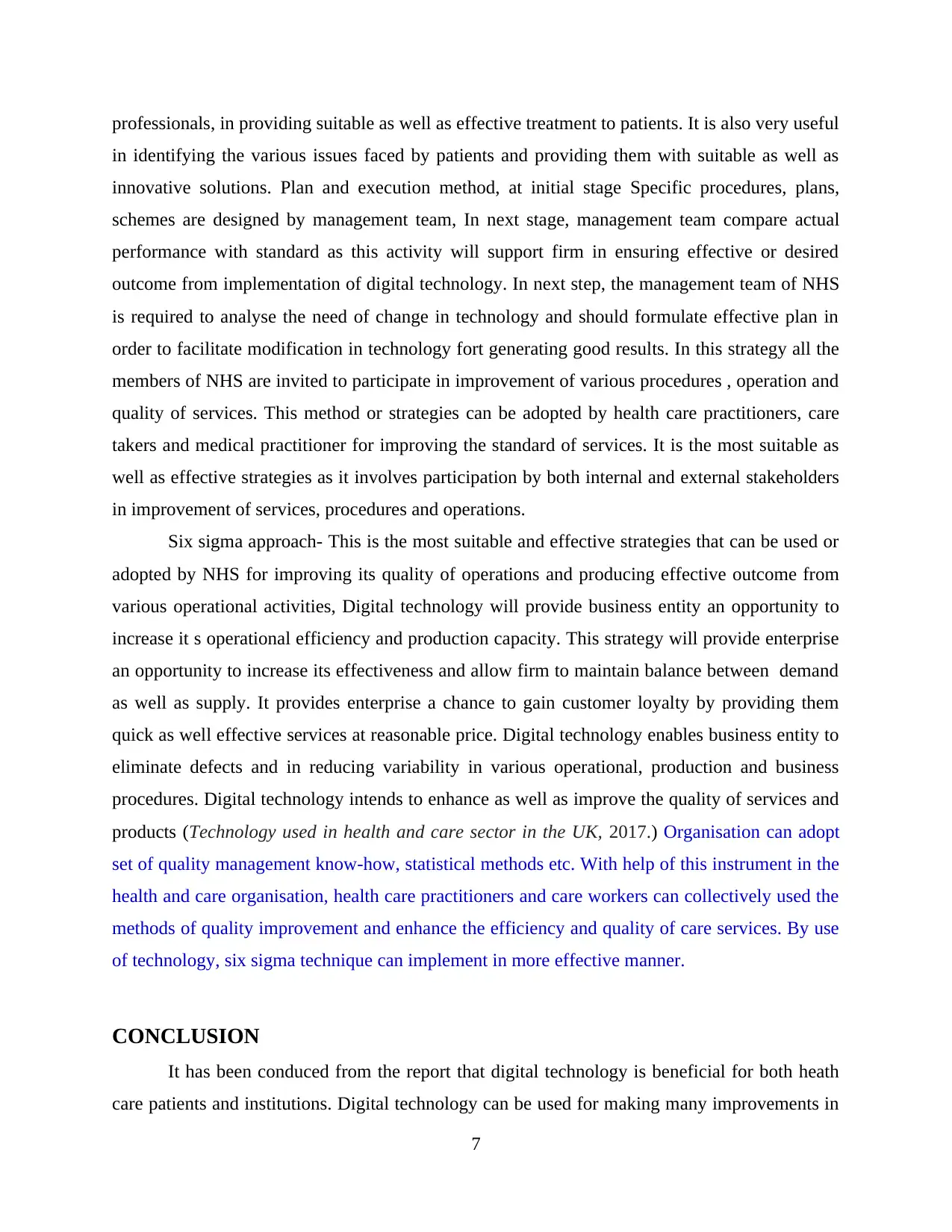
professionals, in providing suitable as well as effective treatment to patients. It is also very useful
in identifying the various issues faced by patients and providing them with suitable as well as
innovative solutions. Plan and execution method, at initial stage Specific procedures, plans,
schemes are designed by management team, In next stage, management team compare actual
performance with standard as this activity will support firm in ensuring effective or desired
outcome from implementation of digital technology. In next step, the management team of NHS
is required to analyse the need of change in technology and should formulate effective plan in
order to facilitate modification in technology fort generating good results. In this strategy all the
members of NHS are invited to participate in improvement of various procedures , operation and
quality of services. This method or strategies can be adopted by health care practitioners, care
takers and medical practitioner for improving the standard of services. It is the most suitable as
well as effective strategies as it involves participation by both internal and external stakeholders
in improvement of services, procedures and operations.
Six sigma approach- This is the most suitable and effective strategies that can be used or
adopted by NHS for improving its quality of operations and producing effective outcome from
various operational activities, Digital technology will provide business entity an opportunity to
increase it s operational efficiency and production capacity. This strategy will provide enterprise
an opportunity to increase its effectiveness and allow firm to maintain balance between demand
as well as supply. It provides enterprise a chance to gain customer loyalty by providing them
quick as well effective services at reasonable price. Digital technology enables business entity to
eliminate defects and in reducing variability in various operational, production and business
procedures. Digital technology intends to enhance as well as improve the quality of services and
products (Technology used in health and care sector in the UK, 2017.) Organisation can adopt
set of quality management know-how, statistical methods etc. With help of this instrument in the
health and care organisation, health care practitioners and care workers can collectively used the
methods of quality improvement and enhance the efficiency and quality of care services. By use
of technology, six sigma technique can implement in more effective manner.
CONCLUSION
It has been conduced from the report that digital technology is beneficial for both heath
care patients and institutions. Digital technology can be used for making many improvements in
7
in identifying the various issues faced by patients and providing them with suitable as well as
innovative solutions. Plan and execution method, at initial stage Specific procedures, plans,
schemes are designed by management team, In next stage, management team compare actual
performance with standard as this activity will support firm in ensuring effective or desired
outcome from implementation of digital technology. In next step, the management team of NHS
is required to analyse the need of change in technology and should formulate effective plan in
order to facilitate modification in technology fort generating good results. In this strategy all the
members of NHS are invited to participate in improvement of various procedures , operation and
quality of services. This method or strategies can be adopted by health care practitioners, care
takers and medical practitioner for improving the standard of services. It is the most suitable as
well as effective strategies as it involves participation by both internal and external stakeholders
in improvement of services, procedures and operations.
Six sigma approach- This is the most suitable and effective strategies that can be used or
adopted by NHS for improving its quality of operations and producing effective outcome from
various operational activities, Digital technology will provide business entity an opportunity to
increase it s operational efficiency and production capacity. This strategy will provide enterprise
an opportunity to increase its effectiveness and allow firm to maintain balance between demand
as well as supply. It provides enterprise a chance to gain customer loyalty by providing them
quick as well effective services at reasonable price. Digital technology enables business entity to
eliminate defects and in reducing variability in various operational, production and business
procedures. Digital technology intends to enhance as well as improve the quality of services and
products (Technology used in health and care sector in the UK, 2017.) Organisation can adopt
set of quality management know-how, statistical methods etc. With help of this instrument in the
health and care organisation, health care practitioners and care workers can collectively used the
methods of quality improvement and enhance the efficiency and quality of care services. By use
of technology, six sigma technique can implement in more effective manner.
CONCLUSION
It has been conduced from the report that digital technology is beneficial for both heath
care patients and institutions. Digital technology can be used for making many improvements in
7
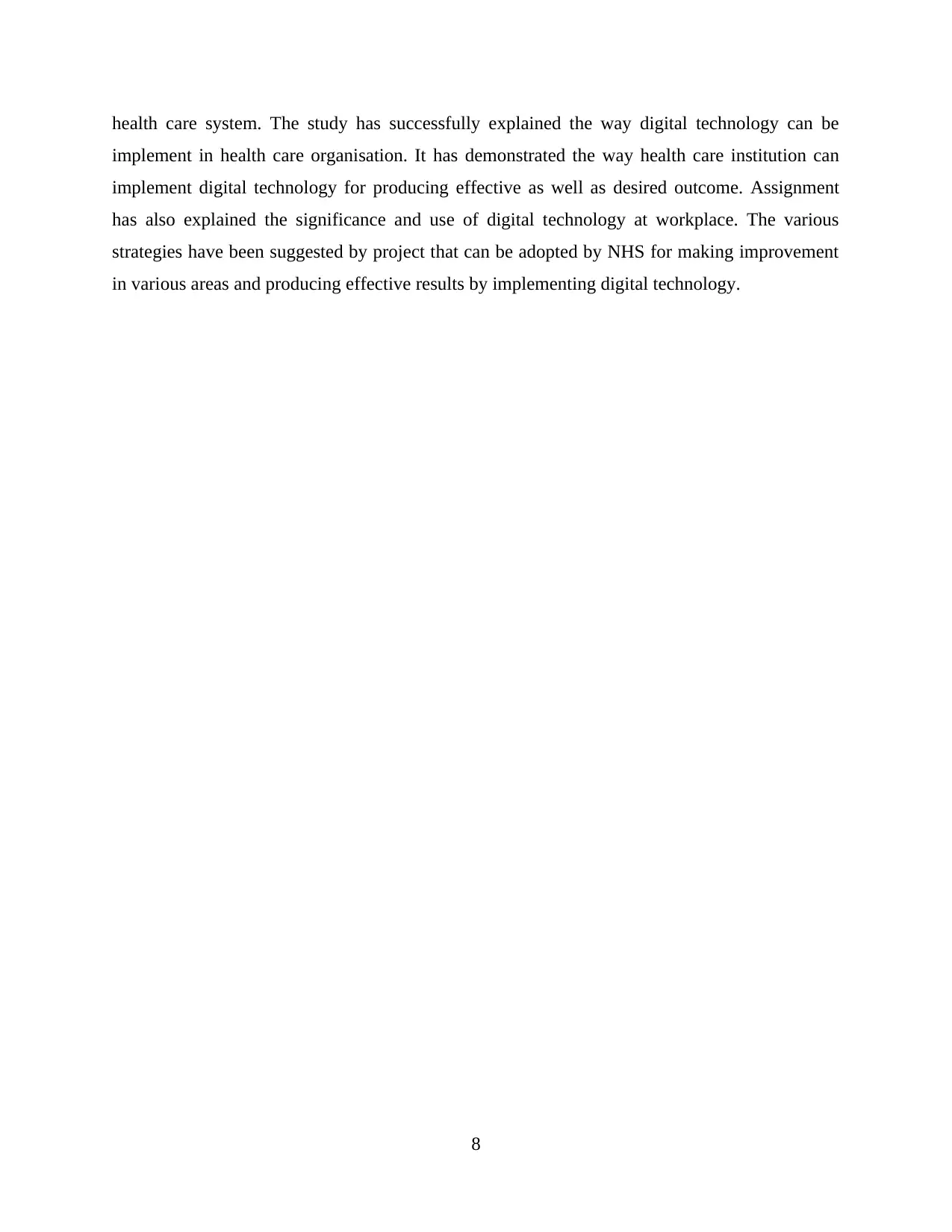
health care system. The study has successfully explained the way digital technology can be
implement in health care organisation. It has demonstrated the way health care institution can
implement digital technology for producing effective as well as desired outcome. Assignment
has also explained the significance and use of digital technology at workplace. The various
strategies have been suggested by project that can be adopted by NHS for making improvement
in various areas and producing effective results by implementing digital technology.
8
implement in health care organisation. It has demonstrated the way health care institution can
implement digital technology for producing effective as well as desired outcome. Assignment
has also explained the significance and use of digital technology at workplace. The various
strategies have been suggested by project that can be adopted by NHS for making improvement
in various areas and producing effective results by implementing digital technology.
8
Paraphrase This Document
Need a fresh take? Get an instant paraphrase of this document with our AI Paraphraser
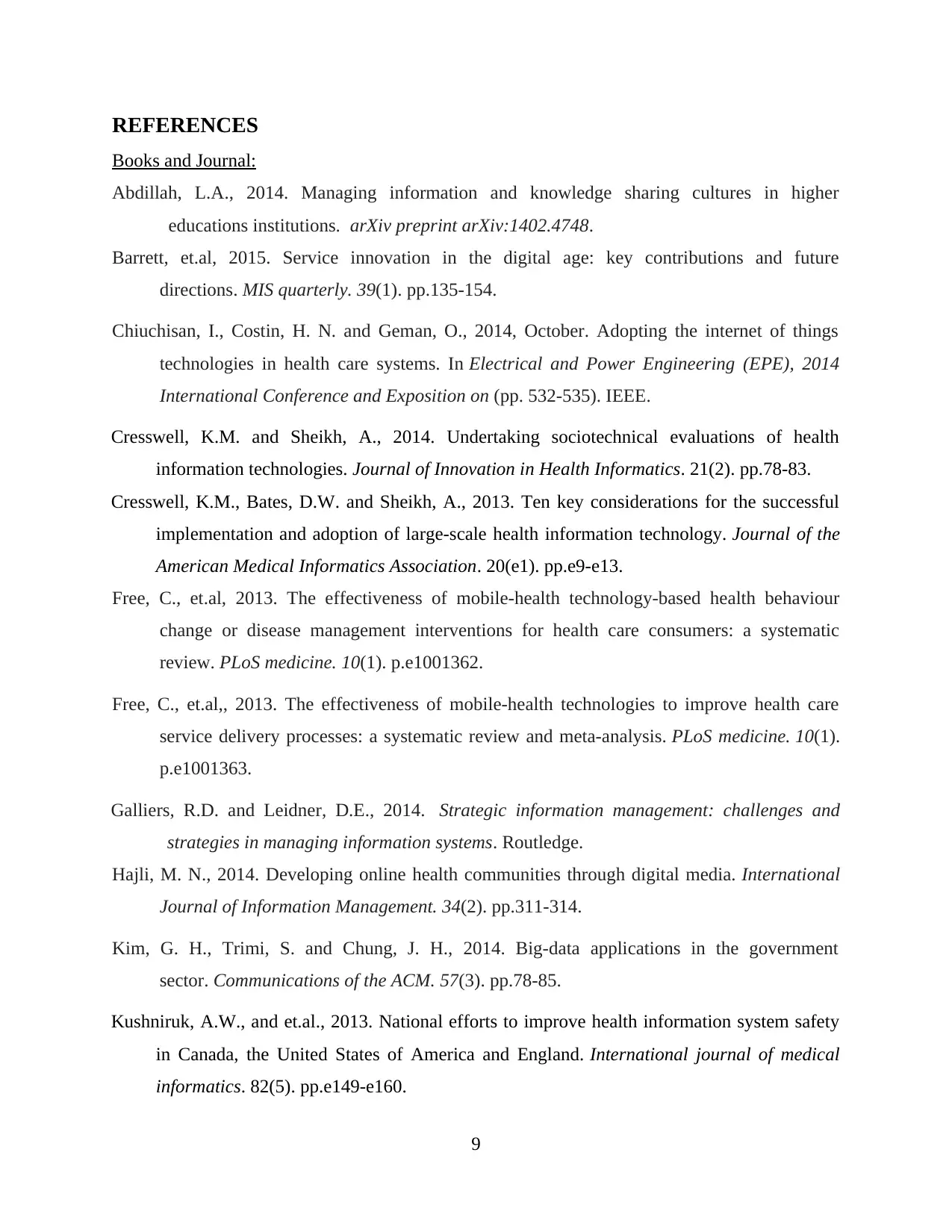
REFERENCES
Books and Journal:
Abdillah, L.A., 2014. Managing information and knowledge sharing cultures in higher
educations institutions. arXiv preprint arXiv:1402.4748.
Barrett, et.al, 2015. Service innovation in the digital age: key contributions and future
directions. MIS quarterly. 39(1). pp.135-154.
Chiuchisan, I., Costin, H. N. and Geman, O., 2014, October. Adopting the internet of things
technologies in health care systems. In Electrical and Power Engineering (EPE), 2014
International Conference and Exposition on (pp. 532-535). IEEE.
Cresswell, K.M. and Sheikh, A., 2014. Undertaking sociotechnical evaluations of health
information technologies. Journal of Innovation in Health Informatics. 21(2). pp.78-83.
Cresswell, K.M., Bates, D.W. and Sheikh, A., 2013. Ten key considerations for the successful
implementation and adoption of large-scale health information technology. Journal of the
American Medical Informatics Association. 20(e1). pp.e9-e13.
Free, C., et.al, 2013. The effectiveness of mobile-health technology-based health behaviour
change or disease management interventions for health care consumers: a systematic
review. PLoS medicine. 10(1). p.e1001362.
Free, C., et.al,, 2013. The effectiveness of mobile-health technologies to improve health care
service delivery processes: a systematic review and meta-analysis. PLoS medicine. 10(1).
p.e1001363.
Galliers, R.D. and Leidner, D.E., 2014. Strategic information management: challenges and
strategies in managing information systems. Routledge.
Hajli, M. N., 2014. Developing online health communities through digital media. International
Journal of Information Management. 34(2). pp.311-314.
Kim, G. H., Trimi, S. and Chung, J. H., 2014. Big-data applications in the government
sector. Communications of the ACM. 57(3). pp.78-85.
Kushniruk, A.W., and et.al., 2013. National efforts to improve health information system safety
in Canada, the United States of America and England. International journal of medical
informatics. 82(5). pp.e149-e160.
9
Books and Journal:
Abdillah, L.A., 2014. Managing information and knowledge sharing cultures in higher
educations institutions. arXiv preprint arXiv:1402.4748.
Barrett, et.al, 2015. Service innovation in the digital age: key contributions and future
directions. MIS quarterly. 39(1). pp.135-154.
Chiuchisan, I., Costin, H. N. and Geman, O., 2014, October. Adopting the internet of things
technologies in health care systems. In Electrical and Power Engineering (EPE), 2014
International Conference and Exposition on (pp. 532-535). IEEE.
Cresswell, K.M. and Sheikh, A., 2014. Undertaking sociotechnical evaluations of health
information technologies. Journal of Innovation in Health Informatics. 21(2). pp.78-83.
Cresswell, K.M., Bates, D.W. and Sheikh, A., 2013. Ten key considerations for the successful
implementation and adoption of large-scale health information technology. Journal of the
American Medical Informatics Association. 20(e1). pp.e9-e13.
Free, C., et.al, 2013. The effectiveness of mobile-health technology-based health behaviour
change or disease management interventions for health care consumers: a systematic
review. PLoS medicine. 10(1). p.e1001362.
Free, C., et.al,, 2013. The effectiveness of mobile-health technologies to improve health care
service delivery processes: a systematic review and meta-analysis. PLoS medicine. 10(1).
p.e1001363.
Galliers, R.D. and Leidner, D.E., 2014. Strategic information management: challenges and
strategies in managing information systems. Routledge.
Hajli, M. N., 2014. Developing online health communities through digital media. International
Journal of Information Management. 34(2). pp.311-314.
Kim, G. H., Trimi, S. and Chung, J. H., 2014. Big-data applications in the government
sector. Communications of the ACM. 57(3). pp.78-85.
Kushniruk, A.W., and et.al., 2013. National efforts to improve health information system safety
in Canada, the United States of America and England. International journal of medical
informatics. 82(5). pp.e149-e160.
9
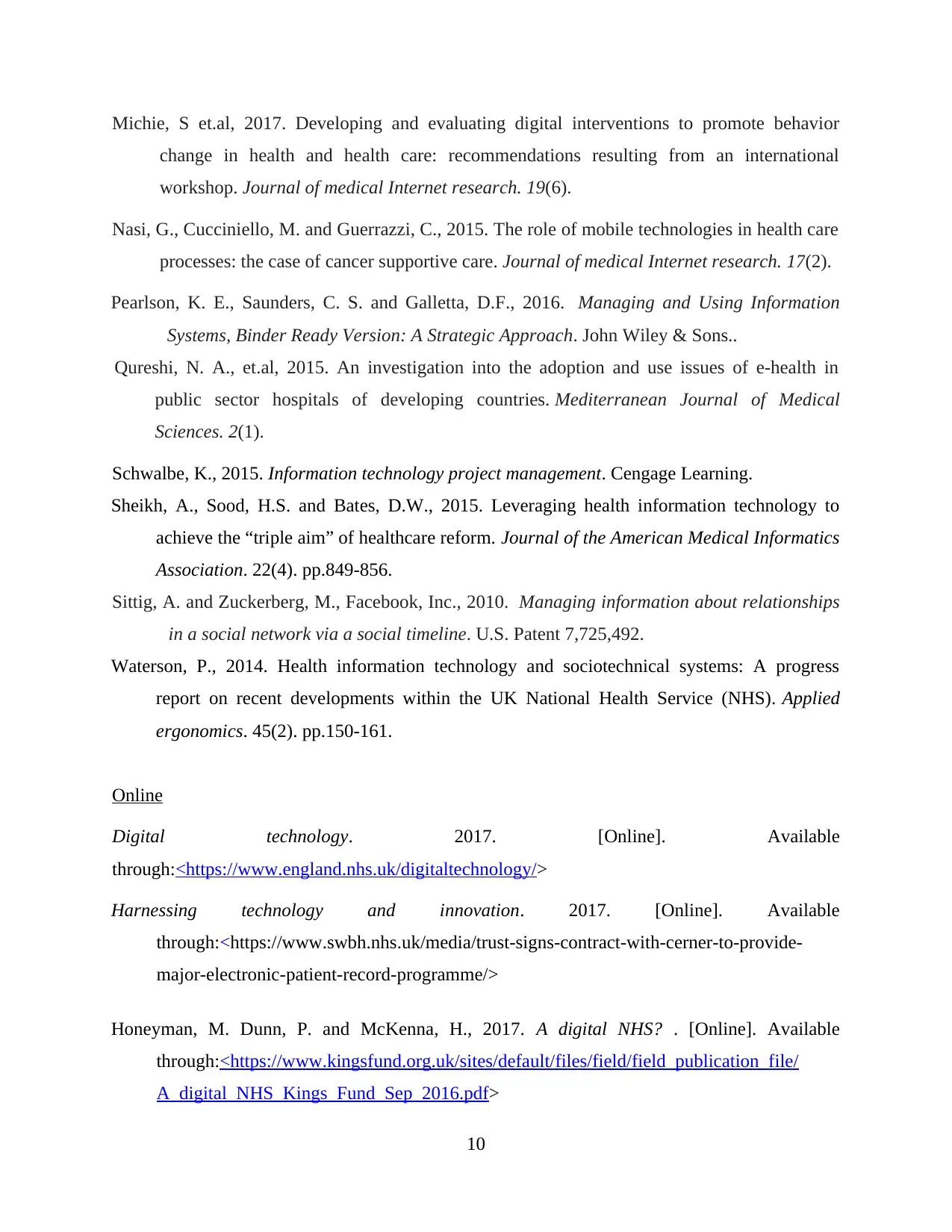
Michie, S et.al, 2017. Developing and evaluating digital interventions to promote behavior
change in health and health care: recommendations resulting from an international
workshop. Journal of medical Internet research. 19(6).
Nasi, G., Cucciniello, M. and Guerrazzi, C., 2015. The role of mobile technologies in health care
processes: the case of cancer supportive care. Journal of medical Internet research. 17(2).
Pearlson, K. E., Saunders, C. S. and Galletta, D.F., 2016. Managing and Using Information
Systems, Binder Ready Version: A Strategic Approach. John Wiley & Sons..
Qureshi, N. A., et.al, 2015. An investigation into the adoption and use issues of e-health in
public sector hospitals of developing countries. Mediterranean Journal of Medical
Sciences. 2(1).
Schwalbe, K., 2015. Information technology project management. Cengage Learning.
Sheikh, A., Sood, H.S. and Bates, D.W., 2015. Leveraging health information technology to
achieve the “triple aim” of healthcare reform. Journal of the American Medical Informatics
Association. 22(4). pp.849-856.
Sittig, A. and Zuckerberg, M., Facebook, Inc., 2010. Managing information about relationships
in a social network via a social timeline. U.S. Patent 7,725,492.
Waterson, P., 2014. Health information technology and sociotechnical systems: A progress
report on recent developments within the UK National Health Service (NHS). Applied
ergonomics. 45(2). pp.150-161.
Online
Digital technology. 2017. [Online]. Available
through:<https://www.england.nhs.uk/digitaltechnology/>
Harnessing technology and innovation. 2017. [Online]. Available
through:<https://www.swbh.nhs.uk/media/trust-signs-contract-with-cerner-to-provide-
major-electronic-patient-record-programme/>
Honeyman, M. Dunn, P. and McKenna, H., 2017. A digital NHS? . [Online]. Available
through:<https://www.kingsfund.org.uk/sites/default/files/field/field_publication_file/
A_digital_NHS_Kings_Fund_Sep_2016.pdf>
10
change in health and health care: recommendations resulting from an international
workshop. Journal of medical Internet research. 19(6).
Nasi, G., Cucciniello, M. and Guerrazzi, C., 2015. The role of mobile technologies in health care
processes: the case of cancer supportive care. Journal of medical Internet research. 17(2).
Pearlson, K. E., Saunders, C. S. and Galletta, D.F., 2016. Managing and Using Information
Systems, Binder Ready Version: A Strategic Approach. John Wiley & Sons..
Qureshi, N. A., et.al, 2015. An investigation into the adoption and use issues of e-health in
public sector hospitals of developing countries. Mediterranean Journal of Medical
Sciences. 2(1).
Schwalbe, K., 2015. Information technology project management. Cengage Learning.
Sheikh, A., Sood, H.S. and Bates, D.W., 2015. Leveraging health information technology to
achieve the “triple aim” of healthcare reform. Journal of the American Medical Informatics
Association. 22(4). pp.849-856.
Sittig, A. and Zuckerberg, M., Facebook, Inc., 2010. Managing information about relationships
in a social network via a social timeline. U.S. Patent 7,725,492.
Waterson, P., 2014. Health information technology and sociotechnical systems: A progress
report on recent developments within the UK National Health Service (NHS). Applied
ergonomics. 45(2). pp.150-161.
Online
Digital technology. 2017. [Online]. Available
through:<https://www.england.nhs.uk/digitaltechnology/>
Harnessing technology and innovation. 2017. [Online]. Available
through:<https://www.swbh.nhs.uk/media/trust-signs-contract-with-cerner-to-provide-
major-electronic-patient-record-programme/>
Honeyman, M. Dunn, P. and McKenna, H., 2017. A digital NHS? . [Online]. Available
through:<https://www.kingsfund.org.uk/sites/default/files/field/field_publication_file/
A_digital_NHS_Kings_Fund_Sep_2016.pdf>
10
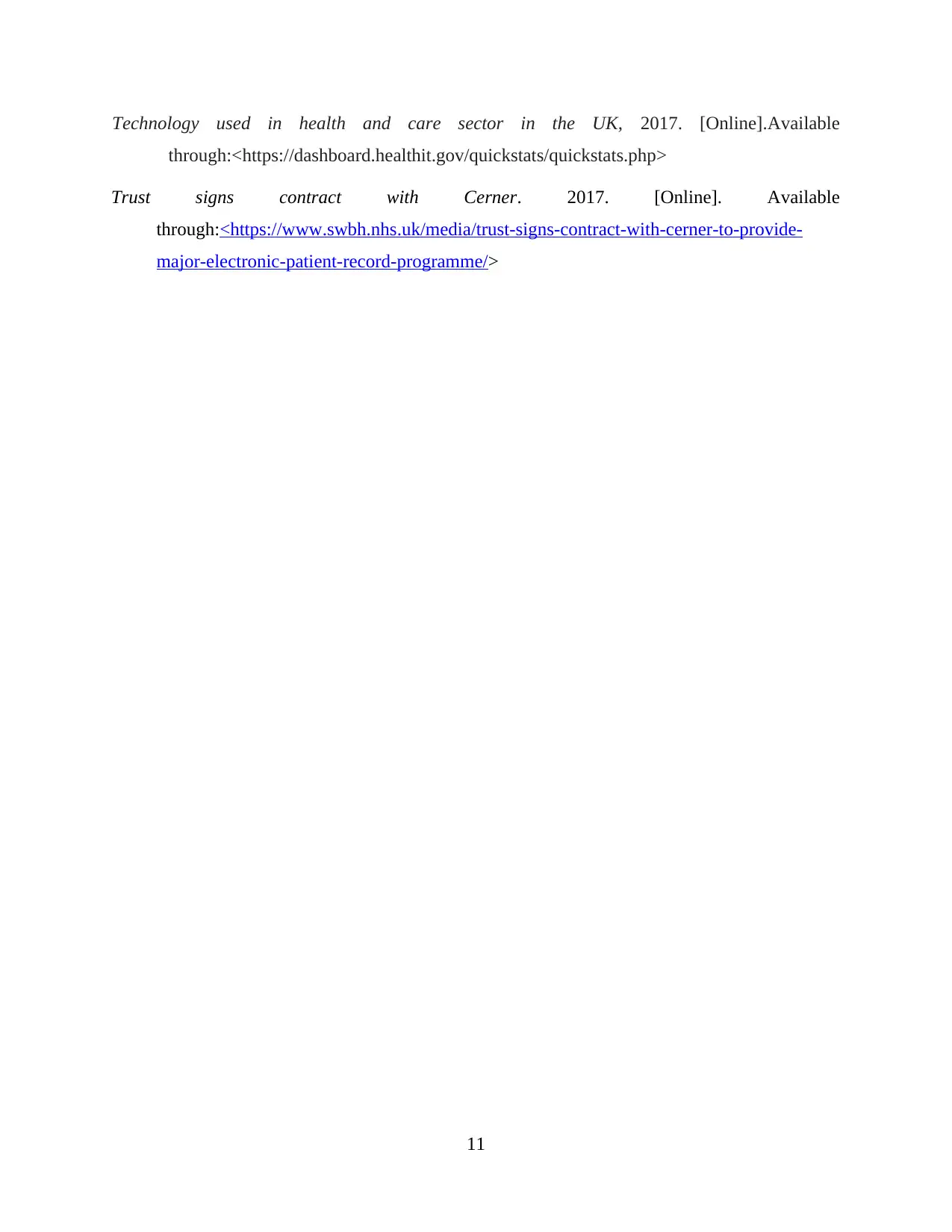
Technology used in health and care sector in the UK, 2017. [Online].Available
through:<https://dashboard.healthit.gov/quickstats/quickstats.php>
Trust signs contract with Cerner. 2017. [Online]. Available
through:<https://www.swbh.nhs.uk/media/trust-signs-contract-with-cerner-to-provide-
major-electronic-patient-record-programme/>
11
through:<https://dashboard.healthit.gov/quickstats/quickstats.php>
Trust signs contract with Cerner. 2017. [Online]. Available
through:<https://www.swbh.nhs.uk/media/trust-signs-contract-with-cerner-to-provide-
major-electronic-patient-record-programme/>
11
1 out of 16
Related Documents
Your All-in-One AI-Powered Toolkit for Academic Success.
+13062052269
info@desklib.com
Available 24*7 on WhatsApp / Email
![[object Object]](/_next/static/media/star-bottom.7253800d.svg)
Unlock your academic potential
© 2024 | Zucol Services PVT LTD | All rights reserved.





